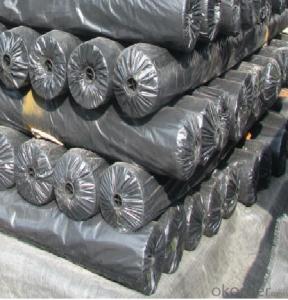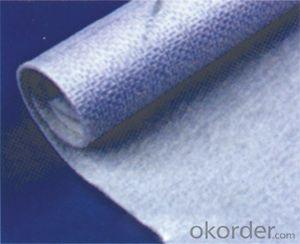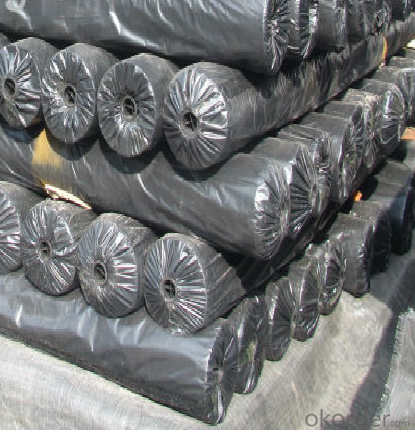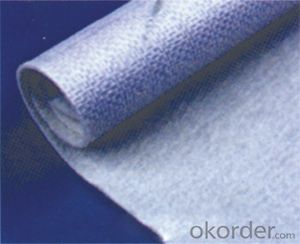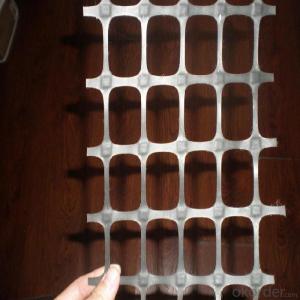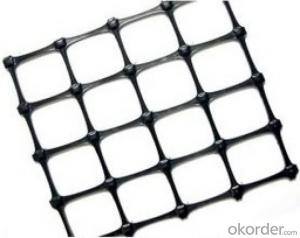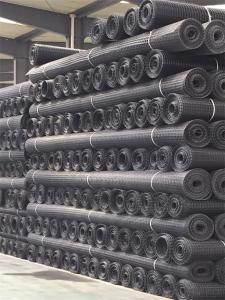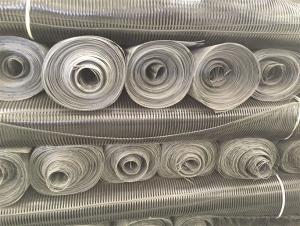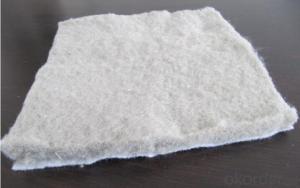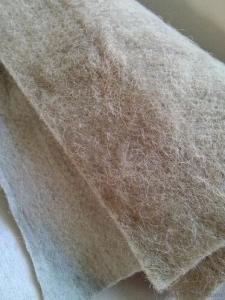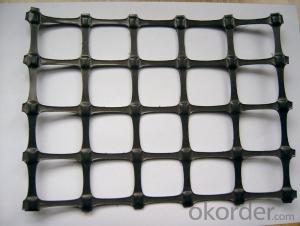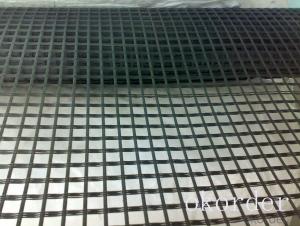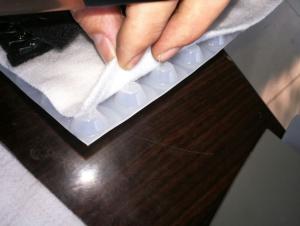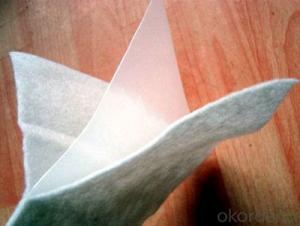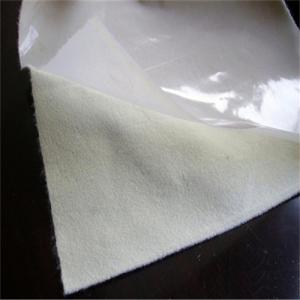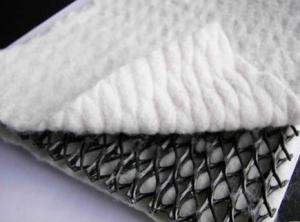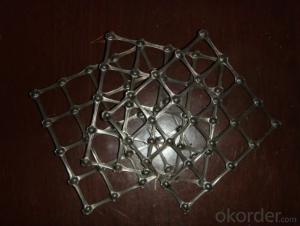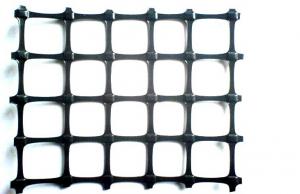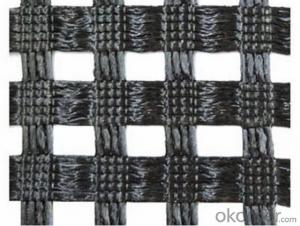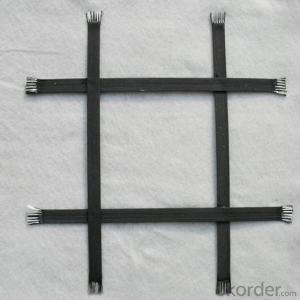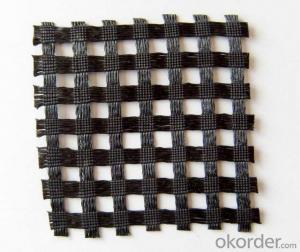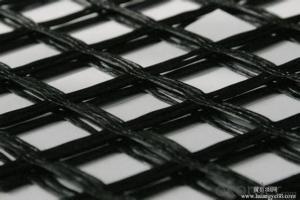Naue Geogrids Knitted Composite Geomembrane for Civil Construction
- Loading Port:
- Qingdao
- Payment Terms:
- TT OR LC
- Min Order Qty:
- 5000 m
- Supply Capability:
- 50000 m/month
OKorder Service Pledge
OKorder Financial Service
You Might Also Like
Specifications
High strength, anti-corrosion, tearing resistant and bursting resistant.
High strength polyester industrial yarns are adopted and, after treated with PVC laminating process, the geomembranes are abtained. These membranes prevent the permeation of water and change the defects of the current geomembranes with low strength and poor water resistance. As a result, they are widely used in such projects as the railroad foundation, dyke protective slopes, reservoirs, highway greenery belts, etc.
Application
Railroad foundations, tunnels, dykes, reservoirs, garbage filling fields, water-prevention and anti-permeation projects. Anti-seepage works of dyke. And application in anti-seepage works of water canal can save 80% of water.
Features
High strength, anti-corrosion, tearing resistant and bursting resistant.
Technical Parameters of Composite Geomembrane
Specification | PLGM-2020 | |
Performance | ||
Strength (kN/m) | Longitudinal | 20 |
Horizontal | 20 | |
Elogation | 30% | |
CBR strength (KN) | >2.5 | |
Thickness (mm) | >0.3 | |
Penetration coefficient (cm/s) | 10-11 | |
Width (m) | 2.5-3.5 | |
Length (m) | 30-50 | |
Functions
Ground stabilization
Drainage
Erosion control and re-vegetation
Revetment
Ground reinforcement
Asphalt underlayment
Road reinforcement
Features
1) Woven geotextile made on circle weave machine
2) Materials: polypropylene and other imported new materials
3) Weight per square meter: 80-700g/m²
4) Width: max. 6m
5) Perfect flexibility and against ultraviolet radiation and aging.
It can be widely used in areas of railways, highways, sport fields, earthwork projects, tunnels, coal mines, walls and slopes, environmental protection, and so on.
All colors and sizes can be customized.
Applications
1-Construction of roads and other trafficked areas (excluding railways and asphalt inclusion)
2-Construction of railways,
3-Earthworks, foundations and retaining structures,
4-Use in drainage systems,
5-Erosion control works (coastal protection, bank revetments),
6-Construction of reservoirs and dams,
7-Construction of canals,
8-Construction of tunnels and underground structures,
9-Use in solid waste disposals,
10-Use in liquid waste containment projects,
Woven Geotextiles Data Sheet
Item | Testing Method | Unit | ||
Grad Tensile Strength | ASTM-D 4632 | N | 890 | 1405 |
Grab Elongation | ASTM-D 4632 | % | ≤20 | ≤20 |
Puncture Strength | ASTM-D 4833 | N | 400 | 667 |
CBR Puncture | ASTM-D 6241 | N | 3200 | 4800 |
Mullen Burst | ASTM-D 3786 | kPA | 2578 | 4137 |
Trapezoidal Tear | ASTM-D 4533 | N | 500 | 750 |
Apparent Opening Size | ASTM-D 4751 | mm | 0.425 | 0.425 |
Permittivity | ASTM-D 4491 | Sec-1 | 0.05 | 0.05 |
Water Flow Rate | ASTM-D 4491 | 1/m/m2 | 163 | 163 |
UV Resistance | ASTM-D 4355 | % 500hrs | 70 | 70 |
Roll Width | m | 6 | 6 | |
Roll Length | m |
100 | 100 | |
Mass | GSM | 200 | 300
|
- Q: What are the factors that affect the design and selection of geogrids for geosynthetic reinforcement of slopes?
- There are several factors that affect the design and selection of geogrids for geosynthetic reinforcement of slopes. These factors include the slope angle, soil type and properties, required design life, anticipated loading conditions, and installation constraints. Additionally, factors such as cost, availability, and environmental considerations may also play a role in the selection process. Overall, a comprehensive assessment of these factors is crucial to ensure the appropriate geogrid is chosen to effectively reinforce and stabilize slopes.
- Q: How are geogrids installed in construction projects?
- Geogrids are typically installed in construction projects by first preparing the ground surface and ensuring it is compacted and leveled. The geogrid is then laid out on the prepared surface and secured in place using stakes or anchor systems. It is important to ensure that the geogrid is properly tensioned and aligned to provide maximum stability and reinforcement. Finally, the geogrid is covered with additional layers of soil or other construction materials to complete the installation.
- Q: What is a civil grille
- The civil grille is also called the geogrid, which is made of polypropylene, polyvinyl chloride and other high molecular polymer, which is made of thermoplastic or molded two dimensional grid or a three-dimensional grid screen with a certain height,
- Q: How do geogrids help in pavement design?
- Geogrids help in pavement design by providing reinforcement and stabilization to the pavement structure. They distribute the load and improve the overall strength and performance of the pavement, reducing the chances of cracking, rutting, and other forms of distress. Additionally, geogrids enhance the longevity and durability of the pavement, reducing maintenance requirements and costs in the long run.
- Q: How do geogrids improve the performance of pavements?
- Geogrids improve the performance of pavements by providing reinforcement and stabilization. They help distribute the load across a wider area, reducing stress on the pavement and preventing cracks and deformations. Additionally, geogrids improve the overall strength and durability of the pavement, increasing its lifespan and reducing maintenance needs.
- Q: How do geogrids improve the performance of mechanically stabilized slopes under dynamic loading?
- Geogrids improve the performance of mechanically stabilized slopes under dynamic loading by providing reinforcement and enhancing the soil's strength and stability. They distribute the applied forces more evenly, reducing stress concentrations and preventing slope failure. Additionally, geogrids increase the friction between soil particles, reducing lateral movement and maintaining slope integrity even during dynamic loading events such as earthquakes or heavy traffic.
- Q: What are the testing methods for geogrids?
- Some commonly used testing methods for geogrids include tensile strength testing, creep testing, puncture resistance testing, and pullout testing.
- Q: Can geogrids be used in reinforcement of coastal structures?
- Yes, geogrids can be used in the reinforcement of coastal structures. Geogrids are commonly used in coastal engineering to enhance the stability and strength of structures such as seawalls, revetments, and breakwaters. They provide additional reinforcement by improving soil cohesion and preventing erosion, thus increasing the durability and resilience of coastal structures against wave action and other environmental forces.
- Q: Can geogrids be used in bridge abutment construction?
- Yes, geogrids can be used in bridge abutment construction. Geogrids are commonly used to reinforce soil and provide stability in various civil engineering applications, including bridge abutments. They can help distribute loads, reduce soil settlement, and enhance the overall strength and stability of the abutment structure.
- Q: Are geogrids resistant to fire?
- No, geogrids are not generally resistant to fire.
Send your message to us
Naue Geogrids Knitted Composite Geomembrane for Civil Construction
- Loading Port:
- Qingdao
- Payment Terms:
- TT OR LC
- Min Order Qty:
- 5000 m
- Supply Capability:
- 50000 m/month
OKorder Service Pledge
OKorder Financial Service
Similar products
Hot products
Hot Searches
Related keywords
